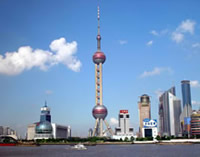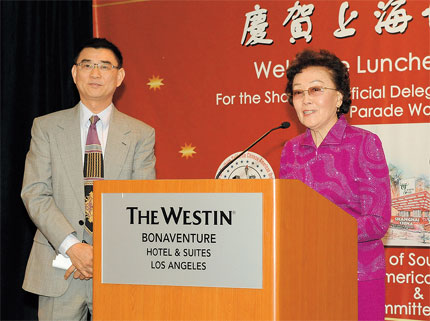|
|


ADVERTISEMENT
Buy Your own advertising
spaces!
.
Download Adobe Acrobat Reader to open [PDF] files.
Recent Visitors
Patriot opens US wallets for Expo float support
2010. 17 January
 Zhang addresses a welcome reception and lunch for the Shanghai float and World Expo 2010 promotion delegation in Los Angeles on December 31, 2009.
Zhang addresses a welcome reception and lunch for the Shanghai float and World Expo 2010 promotion delegation in Los Angeles on December 31, 2009.
by Yan Zhen
(shanghaidaily.com)
US resident Zhang Sujiu has an almost impeccible China pedigree: her army general father led the defence of Shanghai against the Japanese invasion, she coordinates Sino-US communities and raises funds for Tsinghua University. And recently, she organized the Expo Shanghai float in a big New Year's Day parade, Yan Zhen reports.
She looks like an ordinary, smartly dressed old lady, nothing like you would expect of someone with such a famous family background. She has never lived or worked in Shanghai but she has a strong bloodline connection to the city which she continues to regard with affection.
After decades of a quiet life in southern California, Zhang Sujiu, daughter of a key Kuomintang and Communist Party military figure, recently emerged into the media spotlight as organizer of Shanghai's float in the annual New Year's Day Pasadena Rose Parade in the United States.
"I have retained countless ties with Shanghai throughout the years," said Zhang, who now chairs the Roundtable of Southern California Chinese-American Organizations.
"It is not only because of my family and friends but the city's own charisma as well," said the 70-something woman with curly hair, exquisite facial makeup and butterflies painted on her nails.
Zhang is the youngest daughter of General Zhang Zhizhong, one of the top military commanders in China's war against the Japanese invasion in the 1930s. The general supervised Shanghai's defense against the Japanese army in 1937, one of the largest and bloodiest battles of the eight-year war.
General Zhang also held office as provincial governor of Hunan and Xinjiang in the KMT regime. But he broke with the organization in 1949, refusing to abandon the mainland and flee to Taiwan with late KMT leader Chiang Kai-shek and the remainder of his force.
Zhang consequently developed a good relationship with victorious Communist Party leaders Mao Zedong and Zhou Enlai, living in Beijing until he died in 1969. He was honored as a "Peace General" for his strong resistance to the civil war.
Zhang Sujiu, who has taken the English name Sue, seldom talks about her father or the stories he passed on. This has a lot to do with her low-key attitude but possibly also because she is the youngest of the general's seven children and her memory is not so vivid.
She recalled in a magazine journal some years ago that her father was "stern" and "educating kids to endure hardship from an early age." She remembers being severely scolded by him for using his official car to get to school.
At the time, Zhang lived with her parents and attended middle school in Nanjing, the country's capital before the People's Republic of China was founded. Although the Jiangsu Province city is hundreds of kilometers away from Shanghai, Zhang said that her fondness for Shanghai was nurtured during this period.
"Although I lived in Nanjing, my big brother's home was in Shanghai at the time," said Zhang, sitting in the backyard of her California house. "That's why I dropped into Shanghai on a regular basis."
She was impressed at a young age by traditional Chinese Shanghai's acceptance of the expanding influence of Western modernism, she said. And she remains impressed.
"I can understand Shanghai dialect and ... even speak it a little," Zhang claimed proudly, adding it was partly through mixing closely with her Shanghai-native classmates at Tsinghua University, but more so thanks to her Shanghai husband.
After the New China was founded, General Zhang insisted on staying in Beijing and wrote to his children who were studying or working abroad at the time to ask them all to return, whether they had finished their programs or not.
Zhang was enrolled in Tsinghua University and assigned a teaching job at Tianjin University after graduation in 1954. A year later, she went for further training at Harbin Industrial University in northern Heilongjiang Province where she met her husband Zhu Renzhong.


